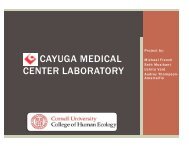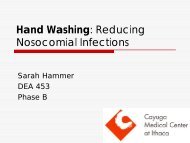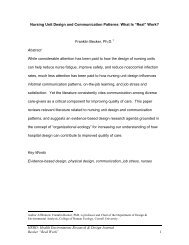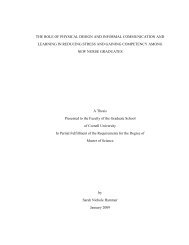The Patient Room: what is the ideal solution? - Cornell University
The Patient Room: what is the ideal solution? - Cornell University
The Patient Room: what is the ideal solution? - Cornell University
Create successful ePaper yourself
Turn your PDF publications into a flip-book with our unique Google optimized e-Paper software.
How do <strong>the</strong>se <strong>is</strong>sues impact <strong>the</strong> admin<strong>is</strong>trator?<br />
<strong>Patient</strong> <strong>Room</strong> and Infection Control<br />
Admin<strong>is</strong>trators have people coming to <strong>the</strong>m constantly wanting things. Whe<strong>the</strong>r it <strong>is</strong> a surgeon wanting a new robotic surgical<br />
device, a radiolog<strong>is</strong>t wanting a new CT scanner, or <strong>the</strong> Infection Control Officer looking for a new ventilation system, everything costs<br />
a great deal of money. Th<strong>is</strong> <strong>is</strong> especially true in <strong>the</strong> world of healthcare because you cannot often just buy something if it <strong>is</strong> a major<br />
investment. You may need to go through <strong>the</strong> CON (certificate of need) process, acquire funding, etc…<br />
Compared to a 256-slice CT scanner, HEPA filters may not seem outrageously priced but <strong>the</strong> admin<strong>is</strong>trator needs to consider o<strong>the</strong>r<br />
options as well as <strong>the</strong> return on investment that can be expected. Estimated HEPA filter costs for a 32-bed unit with 90% efficiency<br />
filters would have an additional first cost of $15,000. Additional operating cost per unit per year would be around $4,000 for <strong>the</strong><br />
increased power necessary, and HEPA filter replacement would cost approximately $6,000 per year for <strong>the</strong> materials and labor.<br />
While HEPA filters are recommended for healthcare facilities by <strong>the</strong> Centers for D<strong>is</strong>ease Control and Prevention (CDC) and <strong>the</strong><br />
Healthcare Infection Control Practices Adv<strong>is</strong>ory Committee (HICPAC), <strong>the</strong>y are not exclusively and cons<strong>is</strong>tently used. <strong>The</strong> added<br />
cost just l<strong>is</strong>ted <strong>is</strong> <strong>the</strong> reason for not exclusively using <strong>the</strong>m. Monetary values did not seem to be available for <strong>the</strong> return on<br />
investment that could be expected from using HEPA filters. <strong>The</strong> ROI would come from patients recovering quicker and going home<br />
sooner. Ano<strong>the</strong>r source would be preventing readm<strong>is</strong>sion. If people improve <strong>the</strong>ir health substantially while <strong>the</strong>y are inpatients <strong>the</strong>y<br />
are much more likely to stay healthy once <strong>the</strong>y leave <strong>the</strong> hospital (Joseph 2006).<br />
Compared to some thing simple such as staff education or placing alcohol hand sanitizing stations in convenient areas, HEPA<br />
filtration actually looks ra<strong>the</strong>r expensive. Whereas alcohol stations have low initial cost and low maintenance, HEPA filters cost<br />
thousands of dollars to both initiate and maintain. <strong>The</strong>se are <strong>the</strong> <strong>is</strong>sues to be dealt with by <strong>the</strong> admin<strong>is</strong>trative staff.<br />
18







